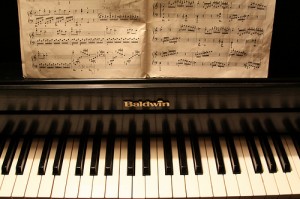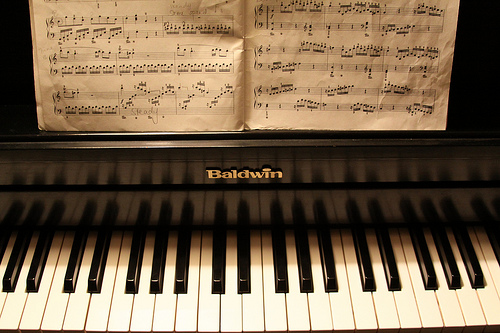 Last week we discussed how to teach legato pedaling to students, and we got a few great responses – click here to check them out! As always, feel free to add your thoughts to the discussion!
Last week we discussed how to teach legato pedaling to students, and we got a few great responses – click here to check them out! As always, feel free to add your thoughts to the discussion!
This week, we are considering the topic of memorization. I’ve seen great discussions about this topic on many websites and forums, and thought we’d explore it here too (hopefully with a different twist)! Here goes:
First, do you consider memorization to be an integral part of piano playing? Meaning, would you say that a concert pianist should or must perform by memory? And do you therefore also require your students to perform by memory, or are you more flexible with your students depending on their goals? What kind of memorization policy have you found works best for your studio?
Leave your thoughts in the comments below!



This spring recital, I’m experimenting with having my students memorize more. In the past, I didn’t make it a requirement – and it’s not a requirement now, per say, but I did include a statement in my recital announcement that students would be “strongly encouraged to memorize their recital piece, as memorization is an important skill for musicians to learn.”
For some students, I will make exceptions – those who are not comfortable or confident enough with the act of performing will be allowed to use their music.
This actually applies to one of my best students. She’s an amazing little pianist, and plays with such skill and emotion, yet she is terrified of playing without the music. At the last recital she decided to play from memory, and it was just a disaster. I felt so awful for her. This was after a month of playing from memory in lessons. She just froze-up at the recital. Poor thing. This time around, I’m encouraging her to memorize the music (as she does so naturally anyway), but to perform it with the music in front of her. She doesn’t even have to look at it – it’s more of a security blanket than anything.
I encourage memorization once the student is familiar with all of the dynamics and technique of the song. I have one young student who tries to memorize how it sounds so that he won’t have to read the notes (even when playing a new song). The amazing thing is that he does NOT play by ear! He tries to remember where his fingers go. I try not to let him play by memory until I am sure he is able to read the song. Sometimes I cover up his hands just to be sure!
With RCM, extra points are given at the exam for songs that are memorized. But it is still the student’s choice in the end. But as a teacher, I would encourage my students to memorize, and I am doing the same with myself as I learn my pieces. I have found that for myself, once I memorize, sometimes the music actually distracts me when I try to follow it. Everyone is different, and it’s key to find out what works for different students.
I don’t require it (except for students that need to memorize for adjudications) but I do encourage it.
I require memorization of recital pieces, with the exception of duets.
Something that has transformed our recitals is we sit and select our recital pieces 8 weeks before the recital date. So yes, the pieces are not their “newest” but they certainly perform their best and confidence is high. I have made exceptions for new songs for some students who learn and internalize quickly – and who are willing to push more to be ready. They usually step up because they know they are the exception to our “rule”.
Another idea I love is to have “dress rehearsal lesson” the week of the recital night, where we go to the recital location for lesson, and act out everything that happens at the recital and give them a chance to play on the recital piano. They like the comfort of knowing exactly what to DO when on stage, besides the playing. Great topic!
Before last year I always had every student memorize 2 pieces for our spring recital. If a student was newer or younger and had trouble I would turn one or both pieces into a duet with me so they could use their music without it being obvious. And everyone always did great – but I could tell many of my students were so nervous and worried about the recital. BUT last year I announced that my biggest goal was for everyone to simply perform their best, for some that would mean using music and for others playing memorized. The kids had more fun and some who we’d planned to use music ended up playing memorized. This spring I’ll have the same goal – everyone simply do their best possible performance.
Thanks for commenting, Amy — I think you’ve made a very important point! The end goal isn’t memorization; it’s about giving a great performance!
I always ask students to memorize their favorite/best pieces. This gives them a repertoire that is handy when asked to perform at locations without music. It is always so humiliating when asked to perform something and having to say “I need my music”. For this repertoire, I’ll ask students to use material a grade or two below their present study level. This takes away from the intimidation that they feel when trying to memorize.
I also ask all students to memorize the material for their concerts, but immediately add that they may use their music if necessary. We then study how to memorize the piece together at the lesson. A few do still use the book at the concert, but many gain confidence and feel comfortable playing without the music. The funny thing is – those students who always memorize their music (poor sight readers) often think that they look more impressive when walking up to perform with the music!
I always encourage (not require) students to memorize at least one of their recital pieces.This year, I’m starting the process a month earlier (8 weeks total prep time). They usually play 2-3 short works, including a duet. I emphasize using a specific process-outlined in a flyer with cartoons I call MJ’s Handy-Dandy Guide! It defines using aural and visual memory and analyzation for form, in addition to finger memory.
For many, I use colored markers to define sections, and draw humorous analogies in the score to highlight tricky spots. After all, laughter is a great way to enhance learning! Thanks, Joy for a wonderful column.
Thanks for your comment, Maryjane! I love all your ideas!!
Have a six year old extremely bright student who reads the music a couple of times and then plays by memory. She is not reading the music as she plays and is not learning the notes etc well enough. Why do you suggest to correct this problem?
Thank you